You don’t need a traditional garden to grow your own fresh, seasonal vegetables and save money at the supermarket. Lots of vegetables can be successfully grown in containers making them perfect for patios, balconies or small gardens that don’t have any soil. We asked expert allotmenteer Lee Senior to share his favourite vegetables to grow in pots and containers. Here’s what he suggests…
Browse our collection of vegetable plants for more inspiration.
1. Asparagus
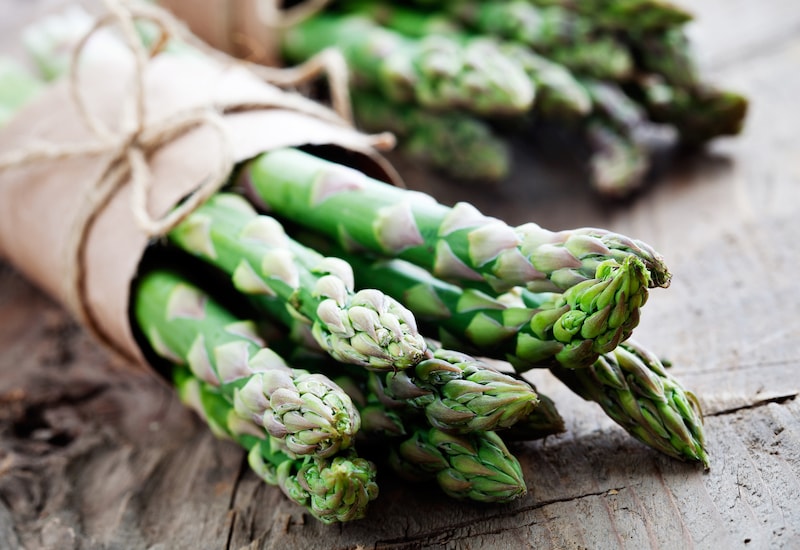
Asparagus is a delicious seasonal vegetable
Image: Suttons
This perennial spring delicacy is more suited to growing in containers than might at first be obvious, and asparagus plants should thrive for many years if given the conditions they need. A large container full of good-quality, well-drained garden compost or well-rotted manure containing plenty of humus is ideal. Alternatively, a rich proprietary compost such as John Innes no 3 can also be used. Apply a top dressing of organic fertiliser in early spring to feed the plants too. Here are my container tips for asparagus:
- Don’t let your asparagus plants dry out in summer.
- Check the drainage in winter to ensure it isn’t too wet or saturated. This reduces the risk of the crowns rotting.
- Some staking will be required as the plants develop. I use canes and string and that works well to stop the ferns blowing over!
- Leave the plants to establish for 3 years before cropping (a very light cropping in year 2 is fine if the plants are thriving).
- Remember to cease cropping every year in early June to allow the plants time to rebuild their strength.
2. Aubergines

Aubergines are ideal for containers
Image: Aubergine ‘Scorpio’ from Suttons (© T&M)
If you’re growing aubergines in outdoor containers, they need plenty of warmth and sunshine in a south-facing, sheltered location to give their best. Otherwise, keep them in the greenhouse or polytunnel for their fairly long growing season. Aubergine ‘Scorpio’ is especially well suited to container growing. If you have a sunny courtyard or patio, it should do very well in warmer parts of the UK. The deep purple fruits can be prolific when conditions are favourable.
- Keep young plants in a frost-free greenhouse in spring, and harden them off well if you want to move them outside. It’s best to wait until very late May or early June to do this.
- Fill your containers with rich, fertile and free-draining compost.
- Keep the compost moist throughout the summer and avoid letting it dry out.
- Feed once a week with a high potash liquid feed as the fruits start to form.
- Outdoors, protect from cold winds and wrap the plants temporarily in fleece during any unseasonably cold spells during summer.
3. Broad Beans

Compact broad beans growing in a wooden trough
Image: Broad Bean ‘The Sutton’ from Suttons
The indefatigable and wonderful tasting Broad Bean ‘The Sutton’ is the perfect variety for outdoor containers due to its compact, dwarf habit. I squeeze 6 plants into a 47cm diameter container. Another variety, Broad Bean ‘Luz de Otono’ is also very good for containers. Although taller than ‘The Sutton’, it can be planted up in November and overwintered as it’s tolerant of light frosts. Here are my container-growing tips:
- Whatever variety you choose, it’s good to support the plants with canes and string if required, especially in windy locations.
- Broad beans need regular moisture and can be planted out in containers until mid-June as long as they’re watered very regularly (often daily during summer).
- The general advice is to pinch out the middles at the top if blackfly strikes. I don’t always do this, as on my own veg patch I’ve regularly seen ladybird larvae mop up the aphids and ‘clean’ the plants within 48hrs of discovering them!
4. Cabbages
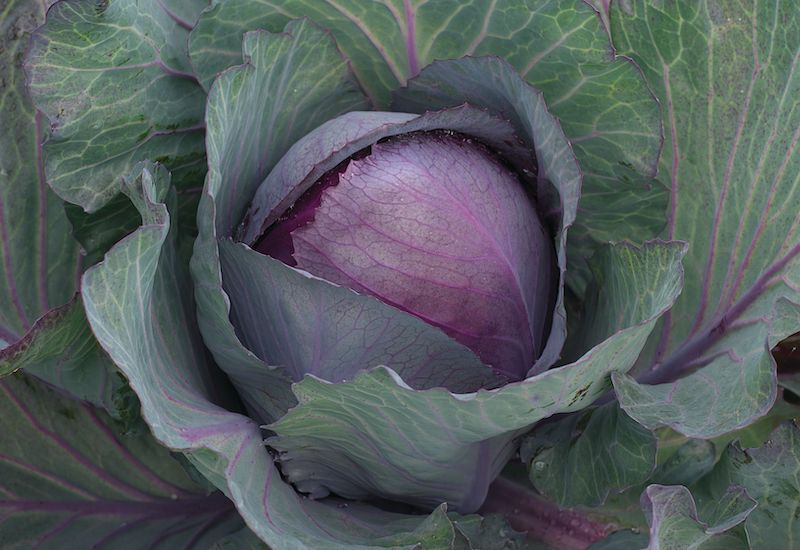
Cabbage ‘Pink Star’ is compact enough for container-growing
Image: Cabbage ‘Pink Star’ from Suttons
Cabbage ‘Pink Star’ is an attractive pink/purple leafed cabbage suitable for containers as it has dense, compact heads. You can grow as many as three in a 47-50cm diameter container outdoors. The heads will be a little smaller than those grown in a raised bed, but they’re the perfect size for using in one go. Cabbage ‘Stelvio’ is another variety perfectly suited to container growing as it can be planted close together due to its compact habit. It has deep green, crinkled leaves and can be harvested in early winter from summer plantings.
- Cabbages need a steady supply of nitrogen to ensure healthy growth as they’re hungry feeders.
- For containers, make sure your compost contains plenty of well-rotted manure or garden compost. You can mix it into proprietary compost if necessary.
- A balanced weekly liquid feed may also help if growth is poor.
- Anti-butterfly netting is needed to protect the plants from cabbage white butterfly attacks. Secure the netting to eliminate any gaps and this will do the trick.
- Keep an eye out for slugs and snails too.
5. Chilli Peppers
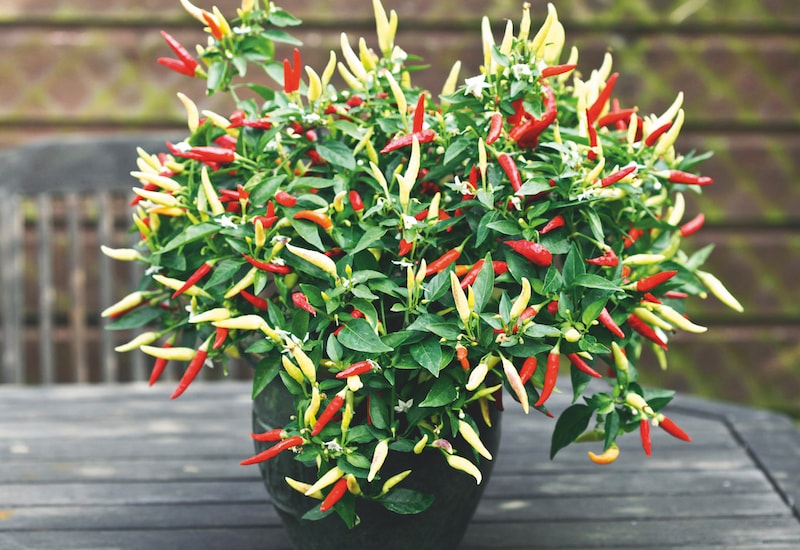
Chillies grow happily in containers
Image: Suttons
Chilli plants are more suited to container-growing in a polytunnel or greenhouse, rather than directly in the open ground. They’ll also grow successfully outdoors if you choose a warm location in full sun, sheltered from any cold winds.
- Move your chillies outdoors in early June, after hardening off, and they’ll grow on until the first frosts. Bring them indoors at this point, to grow on until late autumn.
- Fertile compost and regular watering are vital, but standard proprietary compost will suffice.
- Apply a liquid feed such as a tomato fertiliser as soon as immature peppers start to form.
- In hot, dry periods spray the leaves with warm water to raise humidity.
- Chilli peppers will grow singularly in a relatively small 25cm container. Alternatively they can be planted in groups of three in larger 47-50cm sized containers.
6. Cucumbers

Compact cucumbers can be grown in patio containers
Image: Cucumber ‘Ayda’ from Suttons
Cucumbers thrive in good-sized containers indoors and outside, provided you keep them in a sunny location, out of the wind. If you’re growing them outside, wait until after the risk of frost has passed, and harden them off first. They should keep going until the first autumn frosts. There are some excellent dwarf varieties around like Cucumber ‘Ayda’, an all-female type that produces prolific, baby-sized cucumbers all summer long! Here are my tips for container cucumbers:
- Water the plants well after planting them out and also regularly during dry spells. Watering is vital.
- Humidity is important for cucumbers grown in the greenhouse, polytunnel or outside. Spray the leaves from time to time, using tepid water, avoiding bright sunlight.
- Cucumbers need firmly staking to allow their tendrils to climb upwards. There are a number of ways to do this including using trellis or canes and string or wires. They can reach up to 3m in height and can grow quite vigorously.
- Alternatively, grow ridge type cucumbers. These are dwarf in habit and don’t need any staking.
7. Lettuce
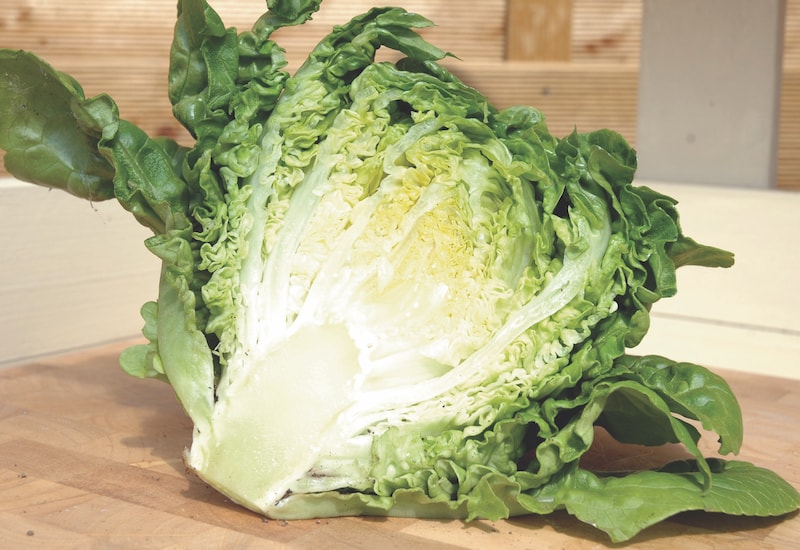
‘Little Gem’ lettuces are compact and delicious
Image: Lettuce ‘Little Gem’ from Suttons (© T&M)
Lettuce grows quickly and easily in outdoor containers. Helpfully, this crop prefers partial sun (rather than full sun all day) so it’s very useful for areas that aren’t south-facing. For container-growing, you can’t go wrong with the classic ‘Little Gem’! Its compact hearts form quickly and reliably and take up little space. It can be planted as late as August for harvesting in autumn.
- Use multi-purpose compost and apply a mulch to retain moisture.
- Remember to water lettuce copiously in dry weather to reduce the risk of bolting.
- Use a balanced liquid feed once per week to help growth and development.
- Keep an eye out for slugs and snails.
8. Mint
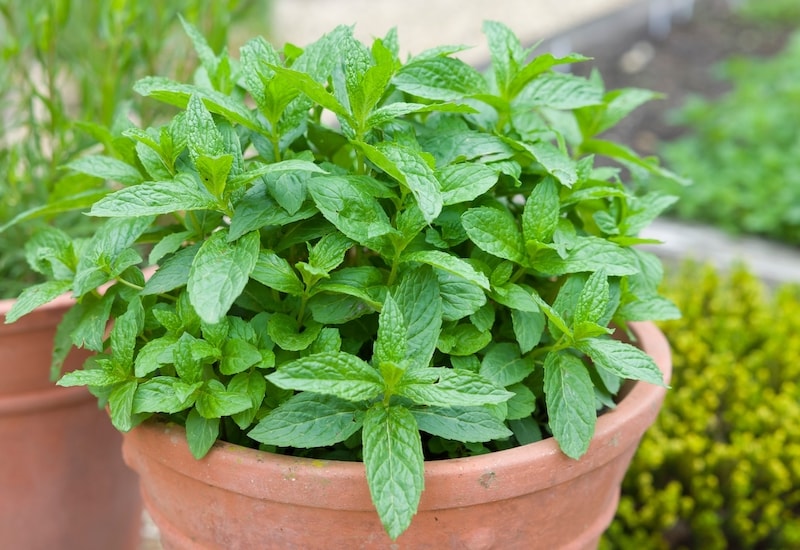
Mint is best grown in containers
Image: Suttons
If ever any plant belongs in a container it’s mint! Due to its invasive nature, containers prevent it from running riot and taking over the veg patch or allotment! In addition, pots of mint make a nice fragrant feature and it’s a great way to begin your gardening journey. Try Mint ‘Moroccan’ for an interesting variety that’s a little sweeter than traditional types.
- There are no special growing conditions required for this tireless perennial herb.
- As long as the container doesn’t dry out for any length of time, it will survive and come back again and again over the course of the following years!
9. Peas
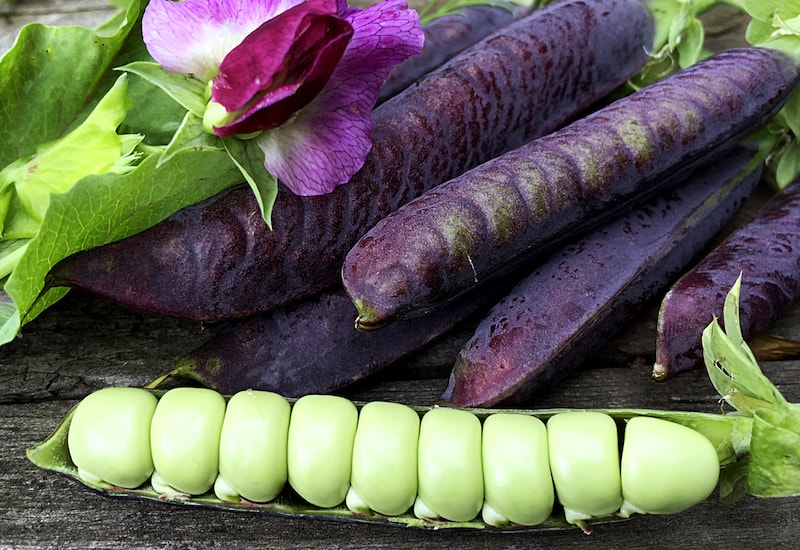
These beautiful peas look great in a patio container
Image: Pea ‘Blauwschokker’ from Suttons (© Branded Garden Products)
Small or medium height varieties of peas are perfectly suitable for growing in larger containers, outdoors. The heritage Pea ‘Blauwschokker’ reaches 1.5m. This medium height variety is ideal for containers and has wonderfully distinct rich purple pods that yield delicious, sweet, green peas when picked young. Here are my tips for container pea-growing:
- Peas need plenty of moisture.
- Use a free-draining compost containing a mix of proprietary compost, garden compost or leafmould to help retain moisture.
- Position your containers in a semi-shady or sunny location, and keep them out of the wind.
- Provide a 2m high climbing structure to allow the peas to climb naturally using their tendrils. This could be pea netting attached to canes, a string and cane structure, or trellis.
10. Rosemary
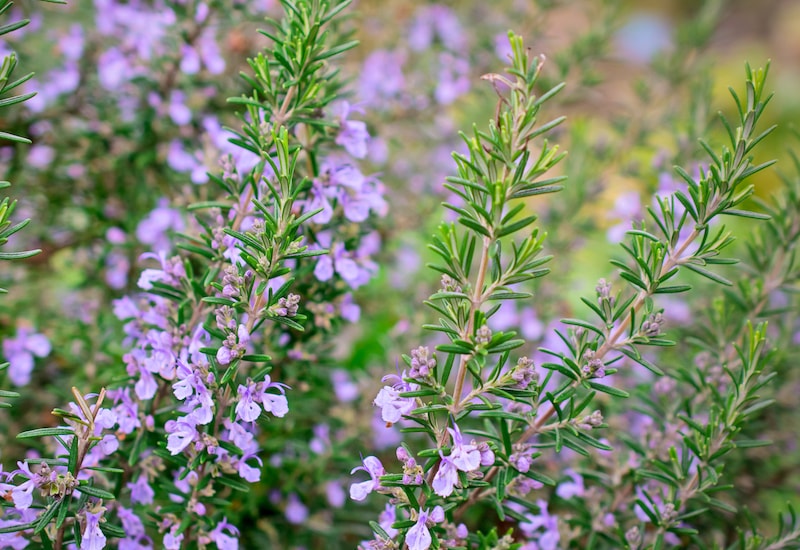
Rosemary is a fantastic ornamental edible
Image: Rosemary ‘Miss Jessop’s Upright’ from Suttons
Rosemary is an easy-going and very rewarding herb to grow and the bees love it too! Its key requirements are shelter and sun. If conditions are suitable, it’s handy to position it just outside the kitchen door for culinary purposes. Rosemary ‘Miss Jessop’s Upright’ holds an RHS Award of Garden Merit. It has lovely lilac-coloured flowers and is well worth growing.
- Use free-draining proprietary compost, preferably with some grit mixed in, to help improve drainage.
- Not much fertility is required so it’s best to avoid any well-rotted organic matter or rich compost mixes.
- If the plants start to get a little woody they can be pruned back towards the base of the stem. Regular harvesting of the tips helps to prevent this.
11. Salad Leaves
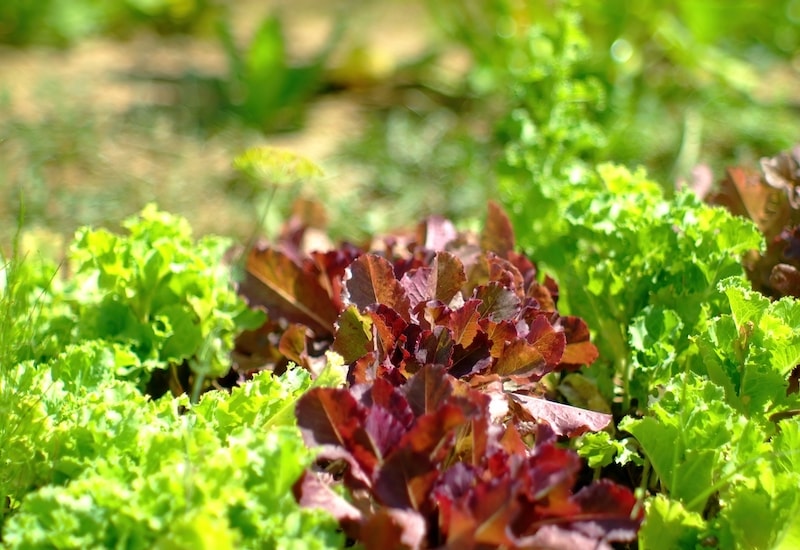
‘Alfresco Mixed’ is a great option for containers or window boxes
Image: Lettuce ‘Alfresco Mixed’ from Suttons
Salad leaves are very easy to grow in containers or even windowboxes. As a cut-and-come-again crop, they can be harvested as baby leaves every 2-3 weeks throughout the summer and deep into autumn. There are many different types of leaves available and they come in a number of different colours too! ‘Lettuce Alfresco Mixed’ is excellent for container growing and provides a mix of endive, radicchio, rocket and lettuce leaves. Regular picking ensures a heavier crop – the more you pick, the more you get!
- Water the plants well straight after planting.
- Keep your containers moist during drier spells.
- Remove any plants that go to seed.
- Keep a lookout for slugs and snails and remove by hand as necessary.
12. Tomatoes
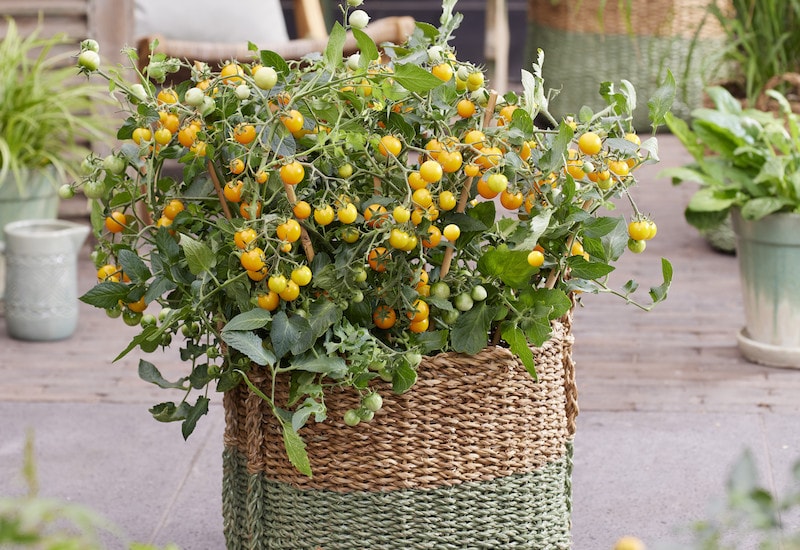
Cherry tomatoes are a good choice for patio growing
Image: Tomato ‘Tiny Temptations Yellow’ from Suttons
Tomatoes grow very well in containers. You can keep them in greenhouses or outside, but always harden your plants off well before moving outdoors. For the best fruits, your container should be positioned in a sunny, south-facing, sheltered position. I always choose a dwarf or trailing variety for my containers. One that’s especially good for hanging baskets is ‘Tiny Temptations Yellow’, a sweet, prolific, trailing variety.
- Water the plants regularly and avoid letting them dry out as the quality of the fruits will be affected and blossom end rot is likely.
- When the trusses start to set, feed weekly with a liquid tomato feed.
- Staking the plants is essential, apart from trailing varieties.
- It’s good practice to ‘stop’ or pinch out the growing points of the outdoor plants in early September. This allows the plants to focus on developing any remaining fruit before the first frosts.
- Removing the foliage can also help with this.
We hope these tips will help you to successfully grow your own container vegetables. See our guide to growing veg on windowsills and balconies if your outside space is more limited. For more of Lee’s practical, hands-on, vegetable growing advice, visit his monthly allotment pages. You can also follow him on Instagram: @lee_senior_gardening.

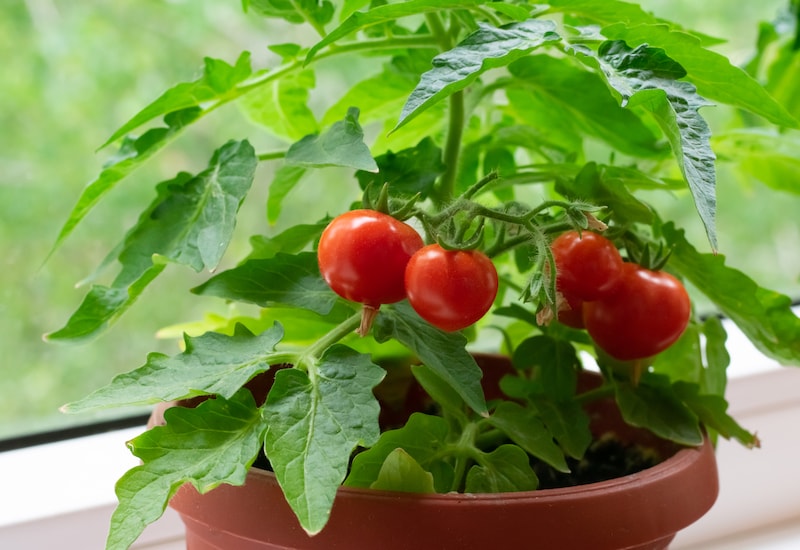

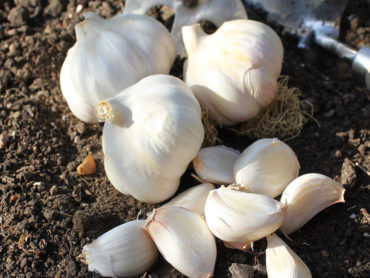
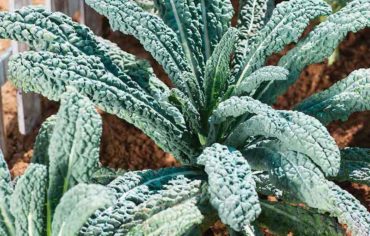
Great reminderBlog Comment Creation that you don’t need a full garden to grow your own veg! I hadn’t considered asparagus for containers before—really helpful to know it can thrive long-term with the right compost and drainage. Curious if anyone’s tried combining it with companion plants in a pot?